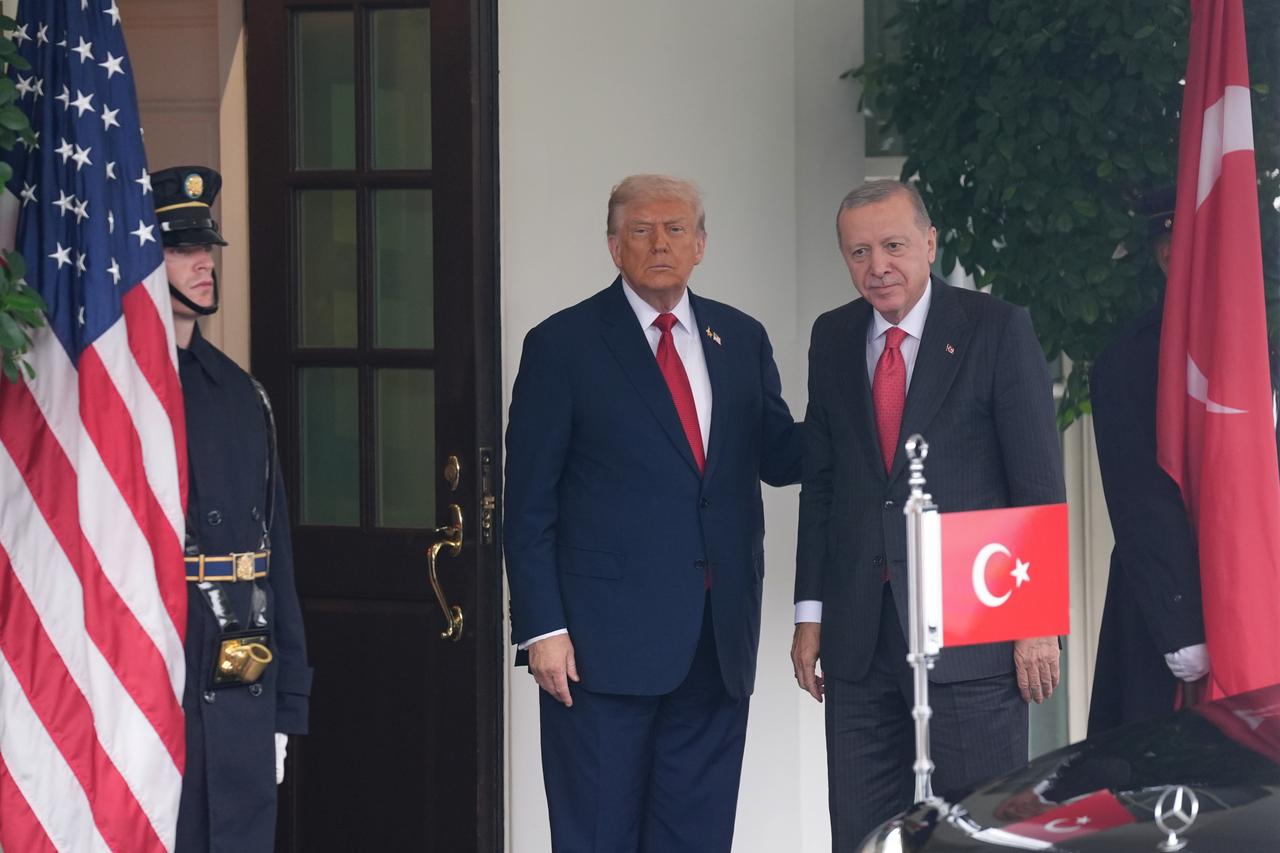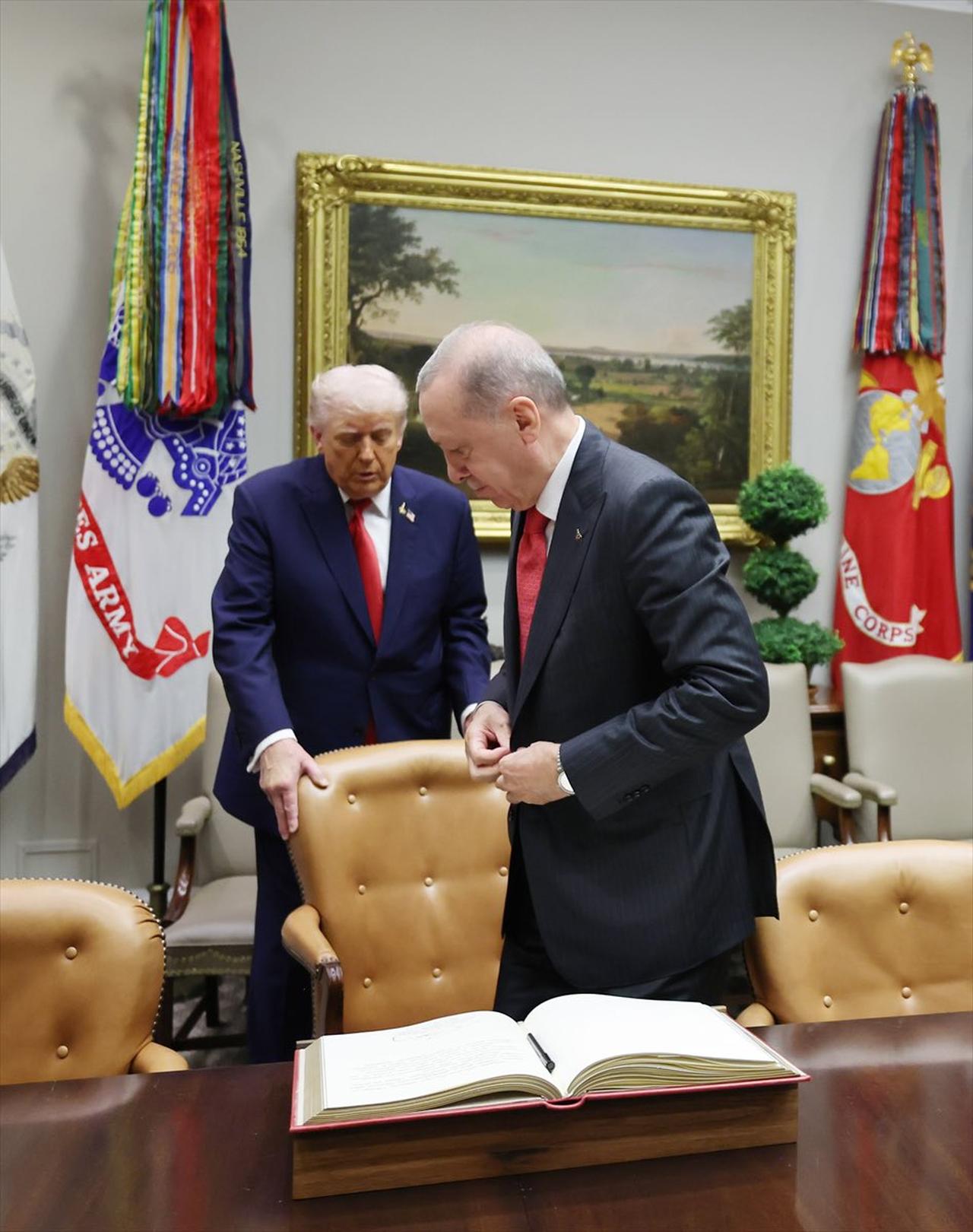
U.S. President Donald Trump welcomed President Recep Tayyip Erdogan to the White House for a key summit on Thursday.
It marks Erdogan’s first visit in six years, with discussions expected to cover F-35 negotiations, CAATSA sanctions, and proposed agreements worth more than $50 billion.
Turkish Airlines’ planned purchase of Boeing aircraft was finalized during the meeting between U.S. President Donald Trump and President Recep Tayyip Erdogan on Thursday, according to U.S. Ambassador to Türkiye and Special Envoy for Syria Tom Barrack.
"The deal is done," Barrack said, without providing further details on the size or structure of the transaction.
Barrack’s statement came shortly after Turkish Airlines had said that negotiations with Boeing were still ongoing. Communications Senior Vice President Yahya Ustun noted last week that while discussions with the U.S. manufacturer had been underway for some time, "no definitive decision has been reached yet."
Turkish Airlines had already reached an agreement with Boeing last year for an order of four 777 freighter aircraft, aimed at strengthening its position in the global cargo market.
Separately, Pegasus Airlines, another Turkish carrier, placed an order last year for 200 Boeing aircraft, underlining the continued role of the U.S. manufacturer in Türkiye’s expanding aviation sector.
President Recep Tayyip Erdogan departed Washington on Thursday aboard the presidential aircraft “TRK,” wrapping up his visit to the United States.
He was seen off at Joint Base Andrews by Turkish Ambassador Sedat Onal and other officials.
Before leaving the White House, Erdogan signed the official guest book and was escorted to the door by U.S. President Donald Trump, who told reporters, "It was a great meeting."
At a press conference held after Erdogan’s departure, Trump said: "Today I met with President Erdogan of Türkiye, and we had a great meeting. I think it was a meeting where we achieved results on many different issues — the things we wanted and the things they wanted."
"When you hear what happened with Erdogan today, you will be really impressed. I think this is a great thing for both countries," Trump added.
Türkiye signed a strategic nuclear deal with the United States during President Recep Tayyip Erdogan’s meeting with President Donald Trump at the White House, aiming to deepen bilateral partnership, Energy and Natural Resources Minister Alparslan Bayraktar said on Thursday.
"We have started a new process that will further deepen the deep-rooted and multidimensional partnership between Türkiye and the United States in the field of nuclear energy," Bayraktar said in a post on X..
Although the Energy Ministry did not provide further details on the nature of the deal, the two countries have been holding talks on the construction of large-scale nuclear power plants and small modular reactors.

U.S. President Donald Trump welcomed President Recep Tayyip Erdogan to the White House for a key summit on Thursday.
It marks Erdogan’s first visit in six years, with discussions expected to cover F-35 negotiations, CAATSA sanctions, and proposed agreements worth more than $50 billion.
U.S. Ambassador to Ankara and Special Envoy for Syria Tom Barrack said Türkiye plays a central role in shaping developments in Syria and suggested that the F-35 dispute with Washington could move toward resolution by the end of the year.
"I would leave the final answer to others, but I cannot say that I was very wrong," he said, adding that further developments could follow soon after the Erdogan–Trump talks.
Speaking to Turkish news outlet CNN Turk after the meeting, Barrack stressed the importance of engaging with all sides during a period of regional uncertainty. He said Türkiye is determined to focus on the future and highlighted Ankara’s influence in persuading Washington to ease sanctions on the Syrian government.
He added that the transition process in Syria would require constitutional reform, resources, and guarantees for Christian minorities, while also addressing Türkiye’s concerns over the presence of the terrorist SDF.
"Syria remains one of the most critical issues for both countries, and we want the regime to listen to its neighbors," Barrack said.
Barrack also noted that S-400 missile systems, F-35 and F-16 fighter jets, the pending Boeing aircraft deal, and the Halkbank legal case were all discussed, describing what he saw as unexpected levels of cooperation between the two sides.
"This is Washington, the word ‘quick’ doesn’t exist," Barrack said, pointing to congressional legislation such as the CAATSA sanctions law and the National Defense Authorization Act (NDAA) as measures that require cooperation between both Congress and the president.
He suggested, however, that progress was being made and a breakthrough was possible, according to Greek news outlet Kathimerini correspondent Lena Argiri.
The meeting between the two leaders ended as President Recep Tayyip Erdogan departed the White House after talks with his U.S. counterpart Donald Trump.
They held a bilateral session in the Oval Office, followed by a working lunch. The meeting, which lasted 138 minutes, was closed to the press.
At the entrance, Trump briefly spoke with Turkish officials including National Intelligence Organization (MIT) head Ibrahim Kalin, Foreign Minister Hakan Fidan, and Energy and Natural Resources Minister Alparslan Bayraktar. An official statement on the talks is still awaited.
President Recep Tayyip Erdogan met with U.S. President Donald Trump at the Oval Office, expressing confidence they would address F-35 and F-16 fighter jet disputes and Halkbank sanctions during their talks.
"I believe we will have the opportunity to discuss in detail the F-35 issue, the F-16 issue, as well as relations regarding Halkbank," Erdogan told reporters before the meeting.
Erdogan said U.S.-Türkiye relations have experienced "a different process" during both of Trump's presidential terms. "We are experiencing a different process in Turkish-American relations, during both the first and second terms of Mr. Trump."
The Turkish president pledged action on reopening the Halki Seminary, the Greek Orthodox theological school closed since 1971. "We are ready to do whatever is necessary regarding the Halki Seminary. When I return, I will have the opportunity to discuss this matter with Patriarch Bartholomew," he said.
Asked about regional cooperation with Trump, Erdogan expressed optimism: "I say this because I believe it. I believe that together, hand in hand, we will overcome these challenges in the region.""
The meeting between U.S. President Donald Trump and President Recep Tayyip Erdogan began at the Oval Office with a joint press conference.
Trump opened his remarks by describing Erdogan as "a highly respected man," and said the talks would focus on key issues including the potential sale of F-16 and F-35 fighter jets to Türkiye, as well as regional conflicts.
He also addressed the Countering America’s Adversaries Through Sanctions Act (CAATSA), which imposed restrictions on Türkiye following its purchase of the Russian S-400 missile defense system. Trump noted that the sanctions "could be lifted immediately if the meeting goes well," signaling possible movement on a longstanding point of tension between the two NATO allies.
Turning to the conflict in Syria, Trump said he had lifted U.S. sanctions at Erdogan’s request, describing the move as recognition of what he called a Turkish victory in the country. "The victory in Syria belonged to Erdogan, and it was a victory for Türkiye," Trump said, adding that the decision was taken in response to Ankara’s role on the ground.
U.S. President Donald Trump greeted President Erdogan at the entrance before the two leaders posed for cameras, shook hands, and walked inside to begin their high-level talks.
According to the official schedule, the program included a question-and-answer session with reporters in the Oval Office at 3:15 p.m. GMT, a working dinner at 3:45 p.m., and Erdogan’s departure from the White House at 4:45 p.m.